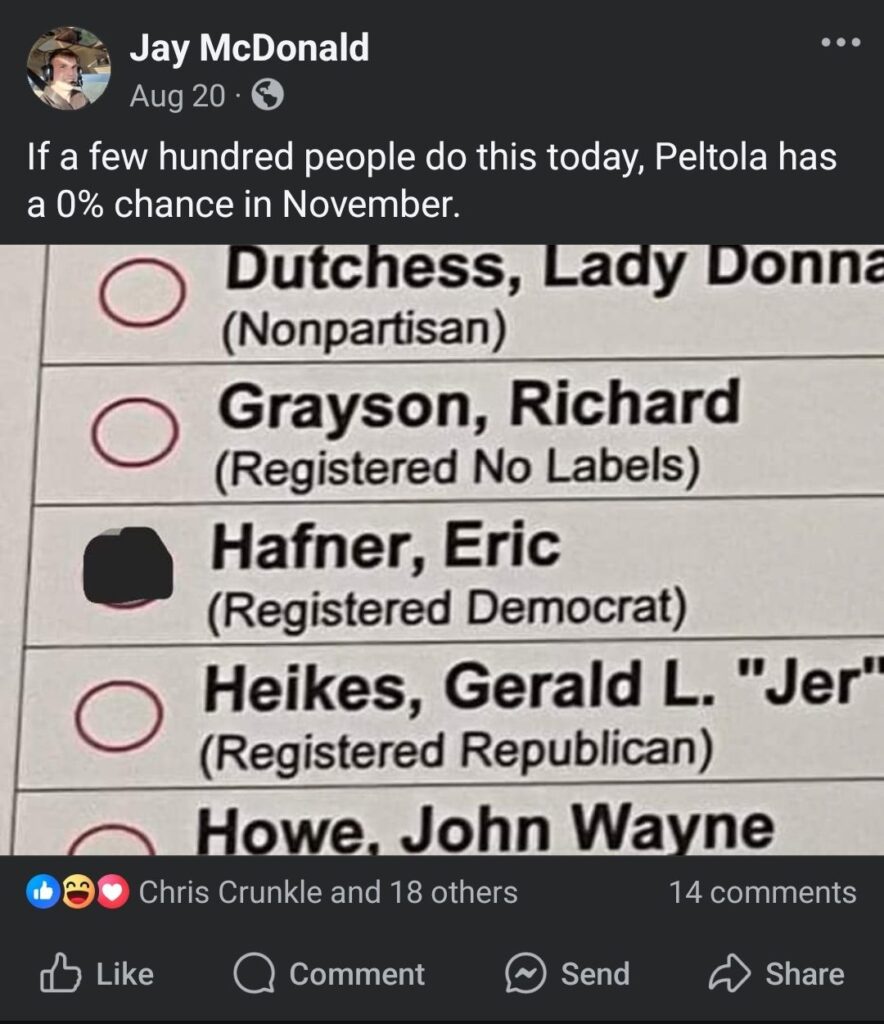Anchorage Superior Court Judge Ian Wheeles on Wednesday ruled against a request by the Alaska Democratic Party for a temporary restraining order and preliminary injunction against the Division of Elections, an effort by Democrats to stop the division from printing the general election ballot with the name of Eric Hafner on it as a Democrat.
In the congressional race, two Republicans pulled out after the primary was over, and Hafner moved up into the fourth slot for the general election ballot, where voters use the ranked-choice voting method.
The Democrats didn’t want Hafner to take votes away from Rep. Mary Peltola, who has evidently hundreds of Democrat detractors. Hafner was originally the sixth vote-getter out of a dozen on the ballot, but he moved up to fourth place, putting him on the general election ballot even though he had less than 1/2 percent of the primary vote.
The Democrats argued that some voters might be confused by Hafner being on the ballot and, since he is serving time in a federal prison, he can’t serve in Congress if he was elected.
Read the complete ruling here:
“Because of how the court has ruled on the above issues, the court deems it necessary to address Hafner as an indispensable party although the issue was not brought before the court by any of the parties. As a matter of due process, the court could not grant the relief sought by the plaintiffs without joining Hafner as an indispensable party. Under Civil Rule l9(a), an indispensable party must be joined in an “action if (1) in the person’s absence complete relief cannot be accorded among those already parties, or (2) the person claims an interest relating to the subject of the action and is so situated that the disposition of the action in the person’s absence may (i) as a practical matter impair or impede the person’s ability to protect that interest ….” Hafner has an actual interest in the outcome of this case and he would be deprived of his interest without due process if the court granted the relief sought by Plaintiffs,” Judge Wheeles wrote.
“Even if Hafner loses in the election, which all parties assume is likely, and the court assumes Hafner also accepts is likely, there is still an interest in being listed as a candidate on a ballot regardless of the results of the election. Without question, many people successfiilly elected into office start out running without the expectation of success, possibly only looking to build narne-recognition or call attention to a campaign issue. Whether that applies to Hafner is immaterial; the right to be placed on a ballot is a separate interest without regard to the ultimate success in the general election. That interest is certainly not adequately represented by an existing party. While the relief sought here is not asking Hafner to do anything, Hafner would still be deprived of his interest without due process of law if he were to be removed from the
ballot with no notice or summons of this proceeding,” the judge ruled.
Anchorage voter Jay McDonald said he cast his ballot for Hafner for the express purpose of getting him onto the general election ballot. It’s the same reason, he said, that political gun-for-hire Jim Lottsfeldt’s group “Vote Alaska Before Party” was trying to get Republicans to vote for Gerald Heikes — to get him on the November ballot and confuse Republican voters.
McDonald said that he would not stand for having his voting rights disenfranchised by the Democrats. He had encouraged others to follow his lead and vote for Hafner, and he believes dozens of people did just that after he posted his ballot and reasoning on Facebook. He was prepared to sue if Hafner was kicked off the ballot.

Open primaries and ranked-choice voting was designed by liberals to ensure more Republicans would be on the November ballots than Democrats and split the campaign donations, volunteers, and momentum of conservatives. But it just didn’t work out that way on the second election to use the new system.
“Congresswoman Mary Peltola won the August 20 primary election with a clear majority of the votes cast. The next three highest vote-getters were all Republicans. But as an apparent result of last-minute machinations at the expense of Alaska voters, two of those three Republican candidates dropped out, and Defendants [Division of Elections] certified late Monday that they intended to place the fifth and sixth-place finishers on the general election ballot in their place,” the lawsuit says.
It goes on to say that the sixth-place finisher, Eric Hafner, the felon who has made violent threats against political figures, judges, and others, cannot and should not be on the ballot.
“Alaska law does not provide for the inclusion of the sixth-place primary finisher on the general election ballot under any circumstances. But if it did allow for such inclusion, Mr. Hafner would need to be replaced by the seventh-place finisher: Mr. Hafner is disqualified from representing Alaska in Congress for two reasons. First, because he is not and cannot possibly become an inhabitant of Alaska—as the U.S. Constitution requires—while he is serving a federal prison sentence in New York until 2036. And second, because he failed to list his full residence address on his declaration of candidacy, as Alaska law requires,” the lawsuit says.
The Division of Elections is on a tight timeline and made a compelling case to the court. In an affidavit, Director Carol Beecher said that the ballot printer began printing ballots on Sept. 6 and must provide test ballots to the division by Sept. 11, so the division can make sure the ballots can be read and counted by the machines.
“The State Review Board will begin logic and accuracy testing using the test ballots on September 11. All the physical components used in the election – meaning the ballots, USB sticks, memory cards, and voting machines-are designed and tested together. The State Review Board and then regional offices conduct logic and accuracy testing to make sure that the ballots will be counted accurately. Logic and accuracy testing will take one or two days,” Beecher wrote.
“Once logic and accuracy testing is complete, the Division will begin printing more than 3,500 ballots for uniformed, overseas, and state advance voters,” Beecher wrote.
State and federal law require the Division to mail absentee ballots to these voters by Sep. 21 — 45 days before the election. These ballots are processed through the United States Postal Service bulk mail facility in Anchorage. Bulk mail is not available on Saturdays, so the Division must mail these ballots on Friday, Sept. 20.
The ballots for uniformed, overseas, and state advance voters will be printed by the Division in-house, rather than by the printer. The Division cannot print these ballots until the State Review Board has completed logic and accuracy testing. Because of the size of the ballots, they will take longer to print, and the Division must take them to a different vendor to fold them. It also takes time to count and organize these ballots, she said.
